
We had the pleasure of interviewing Grazia Cannarsa, Research, and Information Manager from Eurodesk Brussels. With its EU spread network, Eurodesk cooperates with local-level youth organizations and contributes to good practices in the youth sector. Eurodesk has been committed to supporting youth work at the local level. We talked about the organization, its aims, and key activities.
What is the main field of activity of your organization? What issues and challenges in the local youth work is your organization helping to solve?
Eurodesk is a European youth information network created in 1990. The goal of Eurodesk is to make information on learning mobility comprehensive and accessible to both young people and youth workers. To do that, we operate with a network of 39 Eurodesk Centers connected to local information providers in 37 European countries and federating over 3000 so-called “multipliers and ambassadors”. Having local and regional organizations working on a daily basis with young people is essential for delivering youth information and creating bridges between Europe, the opportunities that arise from it, and young people. Most multipliers work as Eurodesk mobility advisors on a voluntary basis. They do so because through Eurodesk they can offer life-changing opportunities to the youngsters they work with. They also find a community of practice, partners for their European projects, and tools and resources to do their daily work. Eurodesk Brussels Link level and the national Eurodesks, offer several networking and training opportunities for them, we prepare ready-made templates for social media promotion, leaflets, and promotional materials that they can easily translate and adapt to their national and local realities. Our goal is to support them in developing quality youth information services at the national level. Therefore, the relation is based on a win-win between them, the national Eurodesks and EBL. This relationship is based on shared values and on the commitment to make all young people aware of the available opportunities. The network is also providing the space in Europe to express their opinions as many are facing challenges such as inflation, shrinking public budgets which are threatening their financial sources, and the lack of recognition of youth information work. At Eurodesk, together with our partner ERYICA, we are calling for a stronger recognition of youth information work, for example with the release of our Competence Framework for Youth Information Workers. It is essential to recognize the role played by the local youth information workers and to also use the networking and learning opportunities offered by being part of a network like Eurodesk at the national and European levels.
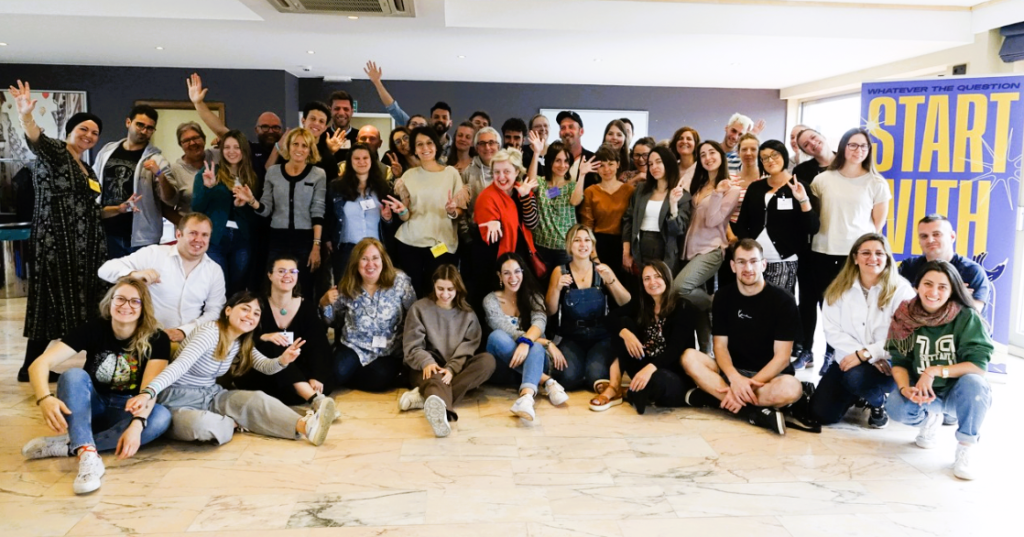
What are your key network activities and partnerships? What are Eurodesk awards?
Eurodesk organizes several network activities. In line with the need for better recognition, the Eurodesk Awards is a good example. We launched the Eurodesk awards in 2011 with the aim of celebrating the day-to-day work of Eurodesk local Multipliers. The multipliers or ambassadors are those who are helping young people discover and seize the numerous opportunities Europe has to offer them. Multipliers are also collecting their most relevant, innovative, empowering, and impactful projects from the local level and highlighting them as a source of inspiration for their peers, and for decision-makers at national and European levels. Alongside the prizes they receive, they have the chance to represent their project at the Awards Ceremony held in Brussels in the presence of high-level representatives from EU institutions and Eurodesk partners.
Another important activity is the Time to Move campaign held each year in October. The campaign targets young people with a focus on NEETS, rural youth, and disadvantaged youth. The campaign is a moment where the network can make some noise and reach out to as many young people as possible through local activities and digital campaigns. The idea behind this is to promote youth mobility and youth participation. Another goal is to make sure young people are aware that the Eurodesk service exists and that they can always turn to their closest local info point for their European projects. Local multipliers are usually very creative and innovative in designing activities that can grasp young people’s attention. Of course, 2024 is the year of the European elections and we are preparing several network activities related to it like social media campaigns, information and promotional materials, training, and peer learning activities. This will be a top priority, including for the European Youth Week coming up in April.
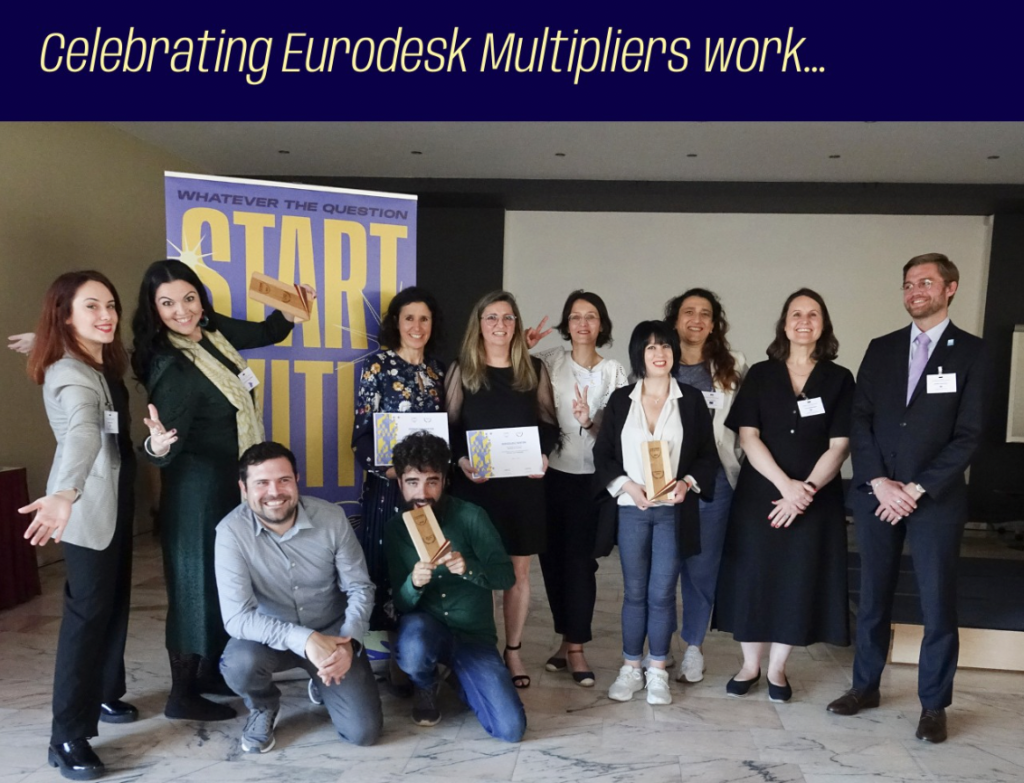
For Eurodesk working with partners is essential. Eurodesk works hand in hand with the European Commission on various initiatives targeting young people, including the European Youth Portal and the European Youth Week. We also work with the European Parliament, and its youth outreach unit in particular, on key events such as the European Youth Event (EYE) taking place every 2 years giving young people from all over Europe and beyond the opportunity to get involved in the European project and to play an active role in shaping its future. Together with ERYICA we work on the recognition and capacity building of the youth information sector. In addition to the competence framework mentioned before, we have published two strategic publications:
1) “Youth Participation in Youth Information Services” which explores the meaning of youth participation in the context of youth information services;
2) “Greening Youth Information Services” which looks at the role of youth information work in the context of the climate emergency, as well as provides tips and good practices when it comes to designing and providing greener youth information services.
We are currently developing a guide in the framework of the YIMinds project – Youth Information minding young people’s mental health, coordinated by ERYICA. This guide aims at developing the capacity of the youth information sector in the field of mental health.
How are Eurodesk and Salto PI collaborating?
Eurodesk and Salto Participation and Information Resource Centre (Salto PI) are working together on the Communication Hub, providing resources to communication and information offices targeting young people. Joint webinars on communication hot topics are also regularly organized in cooperation. These are just a few examples of our cooperation. What also belongs on the list of cooperation projects is the Learning by Leaving Conference, the EPLM, etc.
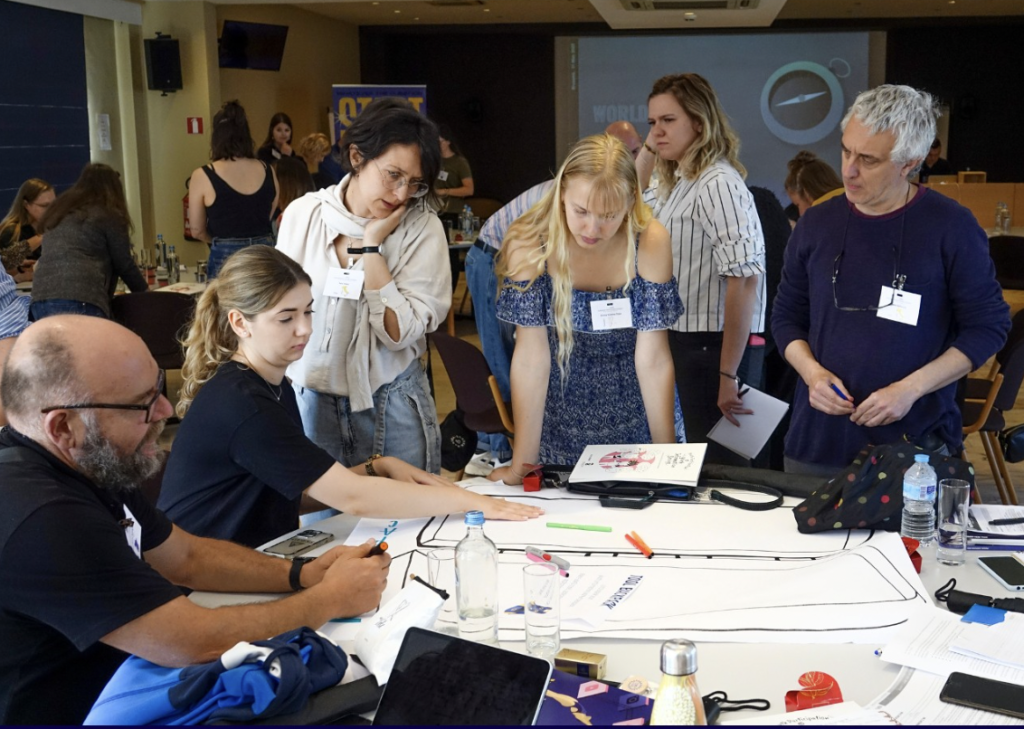
Could you tell us more about the Time to Move campaign, and related ‘card games? What are their aims, activities, and impact?
The Time to Move is an annual flagship campaign that aims to connect young people to the 3000 Eurodesk information points available across Europe through non-formal activities. Every October, the Eurodesk network organizes hundreds of joyful events across Europe and beyond to reach young people. These events, along with a digital campaign consisting of podcasts, online challenges, contests, and games, inform young people about Eurodesk and the information it provides to facilitate access to mobility opportunities. The campaign is managed and supported by Eurodesk Brussels Link, the coordination office of Eurodesk. National Centers and Eurodesk Multipliers implement the campaign at the national level. The campaign has a thematic focus, for example, this year it addresses various topics, including the European Elections 2024, the European Year of Skills, Green Mobility and the DiscoverEU initiative, Mental health and Traveling abroad, and Volunteering and Solidarity. Eurodesk’s “Talkative Thursdays” sessions on Spotify feature podcasts with experts discussing these topics in more detail. The podcasts are published every Thursday in October.
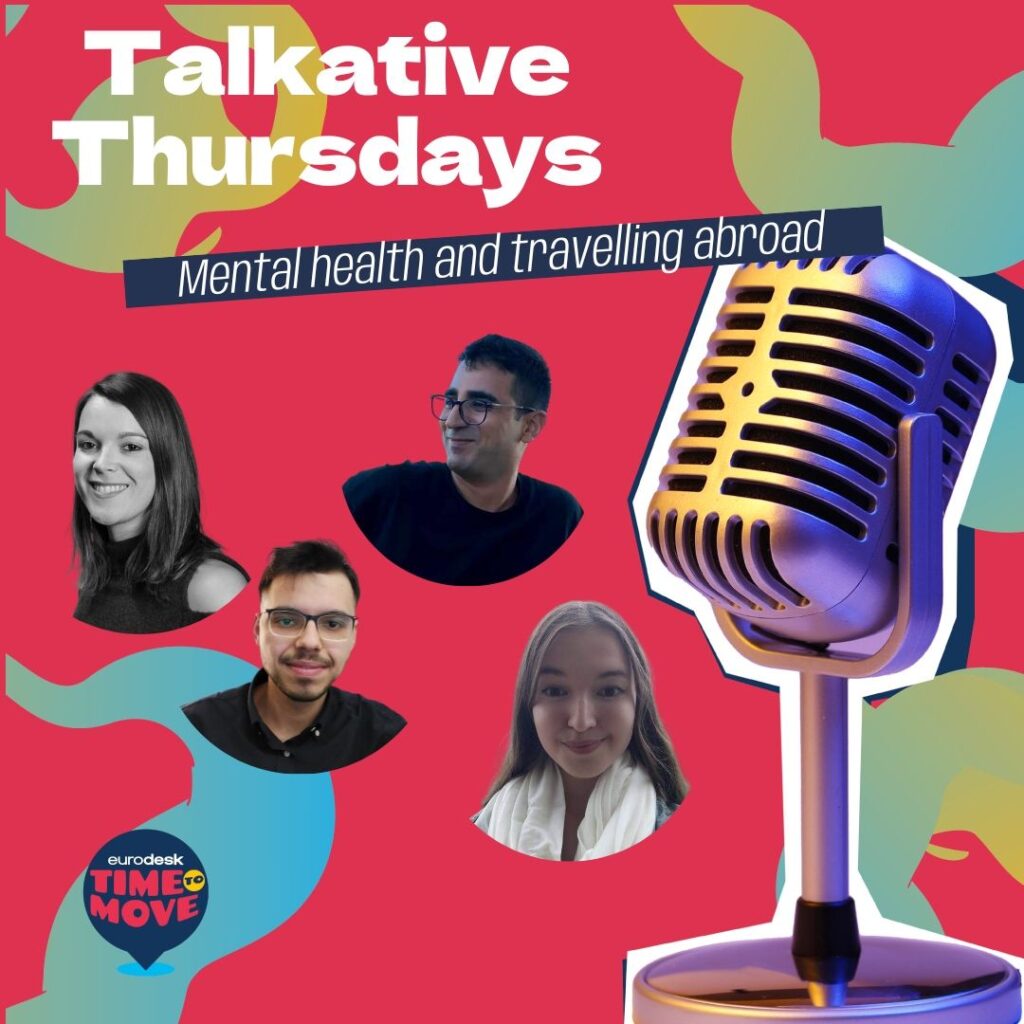
What Eurodesk challenges and games are popular?
Young people can find nearby activities thanks to the interactive map that helps them to search by place, topic, format, or date of the event. Thousands of events take place in almost 25 countries. Every year, we invite all youth to get competitive with the Time to Move contests. Throughout September and October, we run two online challenges – a social media challenge and a T-shirt design contest. The results of these competitions are used for future editions of the campaign, giving a voice and space to young people in the design of the campaign.
After the two Escape Rooms were developed during the pandemic, Eurodesk has decided to develop games for fairs to address the needs of its network and to have attractive resources to use during the campaign. The Time to Move Game “Adventures in Europe” contains both a giant board game and a card game to adapt to various settings. The aim is to introduce young people to the different opportunities Europe can offer them and its rich culture in a fun and exciting way. The Players are given a mission. They need to collect tickets to move around the giant map to embark on their new journey. Through the challenges, they will get to know EU Youth programs and initiatives but also cultural, historical, and fun facts about Europe and its countries. This game has just been released, so we are eager to see how it’s going to be used by the local multipliers and how it will be received by young people. We believe that gaming can help a lot in engaging and informing young people. We already have two online escape rooms the “Adventures in Berlin” and “Mysteries in Riga”, where participants need to cooperate with a friend to solve riddles and challenges. Players can play together on two separate screens and communicate with each other to solve enigmas on the way. The games are easy to access do not require profile creation and collect no data from players. These tools were greatly appreciated by our network during the pandemic, as they could be run online and provided an incentive to bring young people to us, despite the digital fatigue.
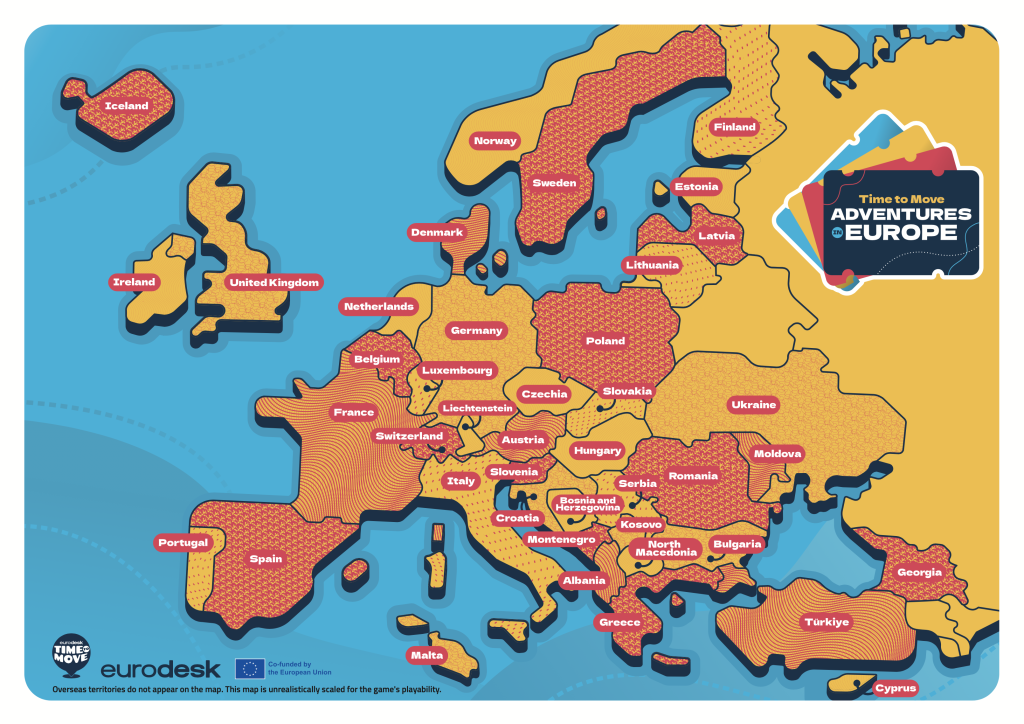
What are some specific projects to support the local youth workers?
For our national coordinators and multipliers, we offer a lot of training and support for their daily work. For example, once a year we organize and host a multipliers seminar in Brussels bringing together Eurodesk colleagues from all over Europe to work together on improving youth information services and to share best practices for reaching out to young Europeans. We have recently revamped our Euroclasses, a Eurodesk project aimed at raising awareness about European opportunities. All the classes are designed for young people, and they are based on non-formal methods. Different thematic modules are available: Euro-Volunteering, Euro-Participation, Euro-Activism and Euro-Working. The classes are impartial and purely informational. They aim to offer young people a space for basic information on European themes, to discover new horizons, and to reflect on societal challenges. The classes are run by our local multipliers, youth workers, and trainers in organizations that are members of Eurodesk. During the EU Elections, as specific Euroclass has been developed to inform young people about the EU and its functioning, and to make them reflect on their vision for Europe and how they can make a difference by voting. Over 200 Euroclasses are going to take place ahead of the elections, thanks to the financial support of the European Parliament. Eurodesk also offers Thematic Training Courses designed for Eurodesk coordinators and multipliers. These 2.5-day courses are usually organized in line with the mission and core tasks of the network and based on the Eurodesk Qualifying Training Programme and Competence Framework. Twice per month, we organize webinars on specific topics where experts and participants can share their experiences, it’s our Wednesday Webinars. We also have developed an eAcademy with resources related to the Eurodesk mission and network activities.
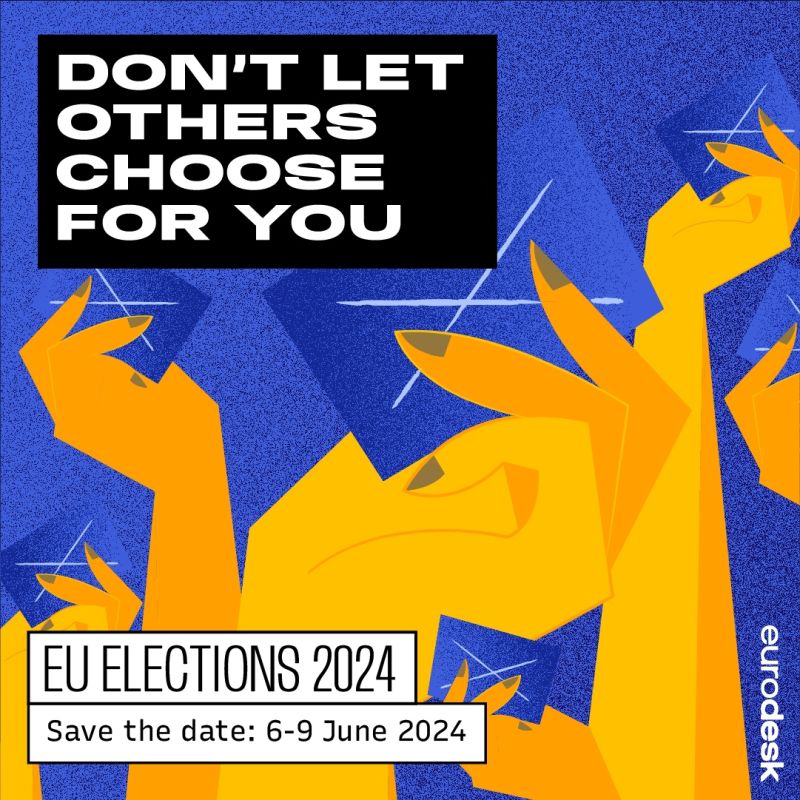
What interesting activities are coming up for Eurodesk this year?
In 2024 Eurodesk will launch our European Elections campaign to reach and engage young people meaningfully in the EU elections. The campaign will consist of online and offline activities across EU countries, and we will also run Euro-elections classes across EU. We will also be involved in the promotion of the European Youth Week taking place in Spring 2024. Another interesting result is the Guide on Inclusion Communication which was launched in November 2023. Inclusion has always been a priority for Eurodesk, however, translating core principles into daily work is not always evident. The guide helps anyone interested in developing an inclusive communication plan, and video tips and resources for implementing and monitoring it as well as checklists and good practice examples. Mental health will also be an important topic for our network with different resources being developed in 2024. We would also like to further work on AI and how it impacts youth work and youth information work, in particular. This is a fundamental challenge to embrace, to have a clear vision and understanding of what it entails for our sector and young people.
Read more: